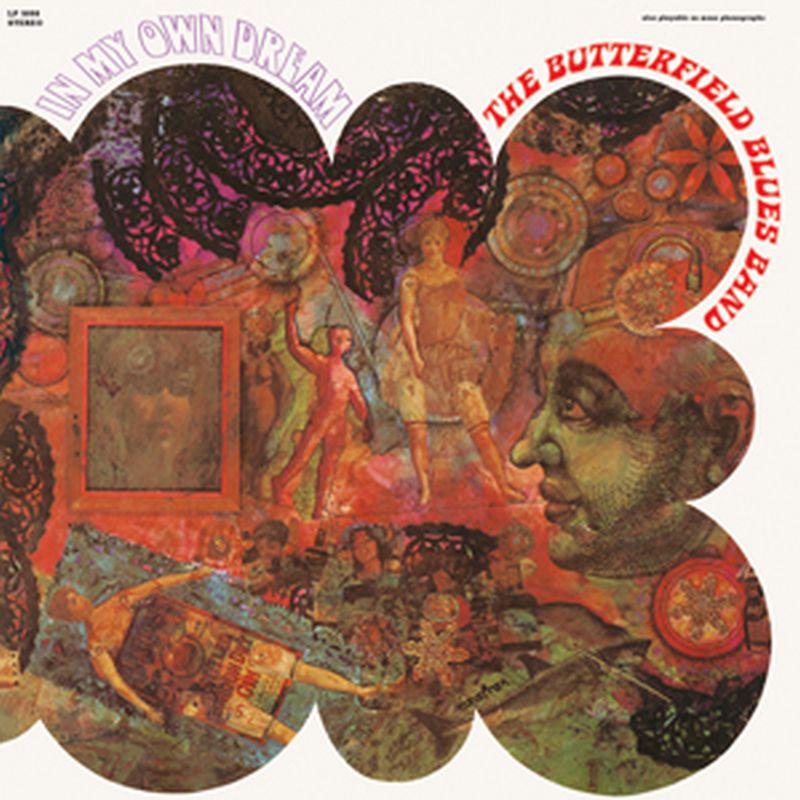The Butterfield Blues Band – In My Own Dream

In My Own Dream (1968)
B-
1. Last Hope’s Gone 2. Mine To Love 3. Get Yourself Together 4. Just To Be With You 5. Morning Blues 6. Drunk Again 7. In My Own Dream
Are you sure this album was recorded by the Butterfield Blues Band? Sounds more like the Bugsy Maugh Adult Jazz Rock Wank Band to me. Why, on an album with only seven songs on it, are there three boring, mediocre songs written by the bass player guy that nobody has ever heard of? And why are only three songs on this Paul Butterfield album actually sung by Paul Butterfield? Furthermore, wouldn’t it be great if beer didn’t make you have to pee every five seconds? These are important issues that need to be addressed.
See, now this is the kind of bloated late 60s mid-tempo jazz influenced nonsense that kinda makes me retch. Or most of it, anyway. Apparently I’m not the only one, cause the fans that had been around since the old days (i.e. three years previously… time just takes forever when it’s the 60s and you’re on acid, man) started turning on Butterfield when this record came out. After all, “Last Hope’s Gone” makes it immediately obvious that the band has abandoned the focus that made the horn section and soul influence work so well on Pigboy Crabshaw even though the lineup is identical to the one that did that record. They mar a perfectly groovy, dejected jazzy bassline with an amorphous structure, a bleating brass/woodwind section that doesn’t add anything to the song in terms of melody and sounds like it was stolen from the score of a forgettable James Bond movie starring Roger Moore, tinkly piano, and guitar noodles that keep popping into the mix at random times. You know, jazzy and shit. And more than half the record is like this! It was part of an effort by some people in the late 60s to supposedly bring culture and refinement to rock by incorporating more adult influences like jazz in the hopes that it would convince music theorists who spent all their time in ivory towers memorizing Miles Davis trumpet solos and scoffing at the simplicity and amateurism of rock music to appreciate the genre. I’m all for experimentation, but isn’t rock ‘n roll supposed to be about freaking out your parents, not pleasing them? (Or at least it was 45 years ago, back in the rebellious 60s, before everything about rock basically became a corporate brand. Or at least that’s what I’m led to believe by aging hippies who tell me the music meant something back then, man). Then after this we had prog bands like King Crimson and Emerson, Lake And Palmer playing four hour bass solos and incorporating references to classical music to prove how sophisticated they were. In this way, the Butterfield Blues Band and In My Own Dream are entirely responsible for the existence of Yes’ Tormato. Thanks a lot, assholes.
So basically the first five sevenths of this album are not a style of music I particularly enjoy. They give the “Last Hope’s Gone” treatment to “Just To Be With You,” a song originally done by Muddy Waters and first covered in stripped down fashion by this band on The Original Lost Elektra Sessions, stretching it out to six minutes thanks to the sluggish tempos and all the soloing. But due largely to the fact that Paul actually sings it and plays a bunch of harp on it, it’s still better than the Maugh tunes, two of which their composer sings himself and are just totally nondescript jazz rock boringness, and the third of which, “Get Yourself Together,” is a gospel send up that at least has a rockin’ guitar intro, a fun, upbeat arrangement, and fine vocals by drummer Phil Wilson, but it’s pretty slight, fluffy stuff if you ask me.
The last two songs rescue the record from further mediocrity. Bishop’s “Drunk Again” is a dumb joke that probably isn’t as funny as it thinks it is, but it’s still pretty amusing, with Bishop acting the part of a slurring booze hound as the band plays a quiet, woozy shuffle behind him – like my dad once said, even the harmonica sounds drunk! It probably takes a little too long meandering toward the payoff at the end—an explosion into a searing guitar solo—but I’ll take what I can get. Then closing us out is the Butterfield-penned title track, which is about 100 times more interesting of a song than anything else on here. Thing is, it’s also much more of a departure from the band’s original sound than anything else on here too – it’s, uh, like, singer-songwriter music. Paul plays acoustic guitar and everything! But far from formulaic, “In My Own Dream” starts out as a buoyant waltz with chiming mandolin strums before shifting to a country rock-style piano-based bridge that wouldn’t sound out of place if performed by the Allman Brothers or something, before ceding to an extended soprano sax solo that incorporates the jazz influence way more smoothly and intriguingly than anything else on this album does. It’s by far the most sublimely weird creation of Paul Butterfield’s career, and really I don’t think I’ve ever heard another song quite like it. But why bother writing more than one interesting song when you can just do a bunch of slow, boring jazz rock instead? Who’s with me?
